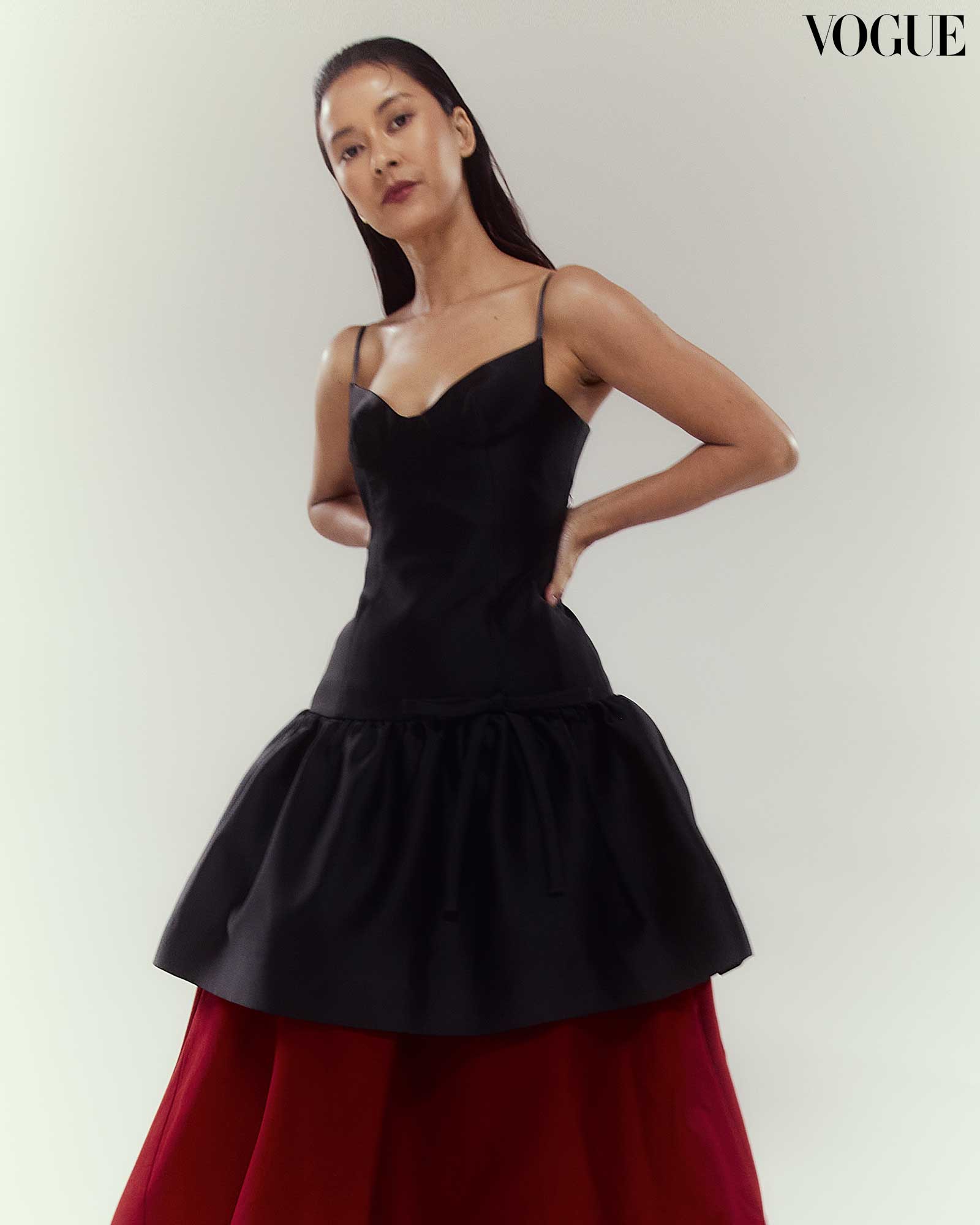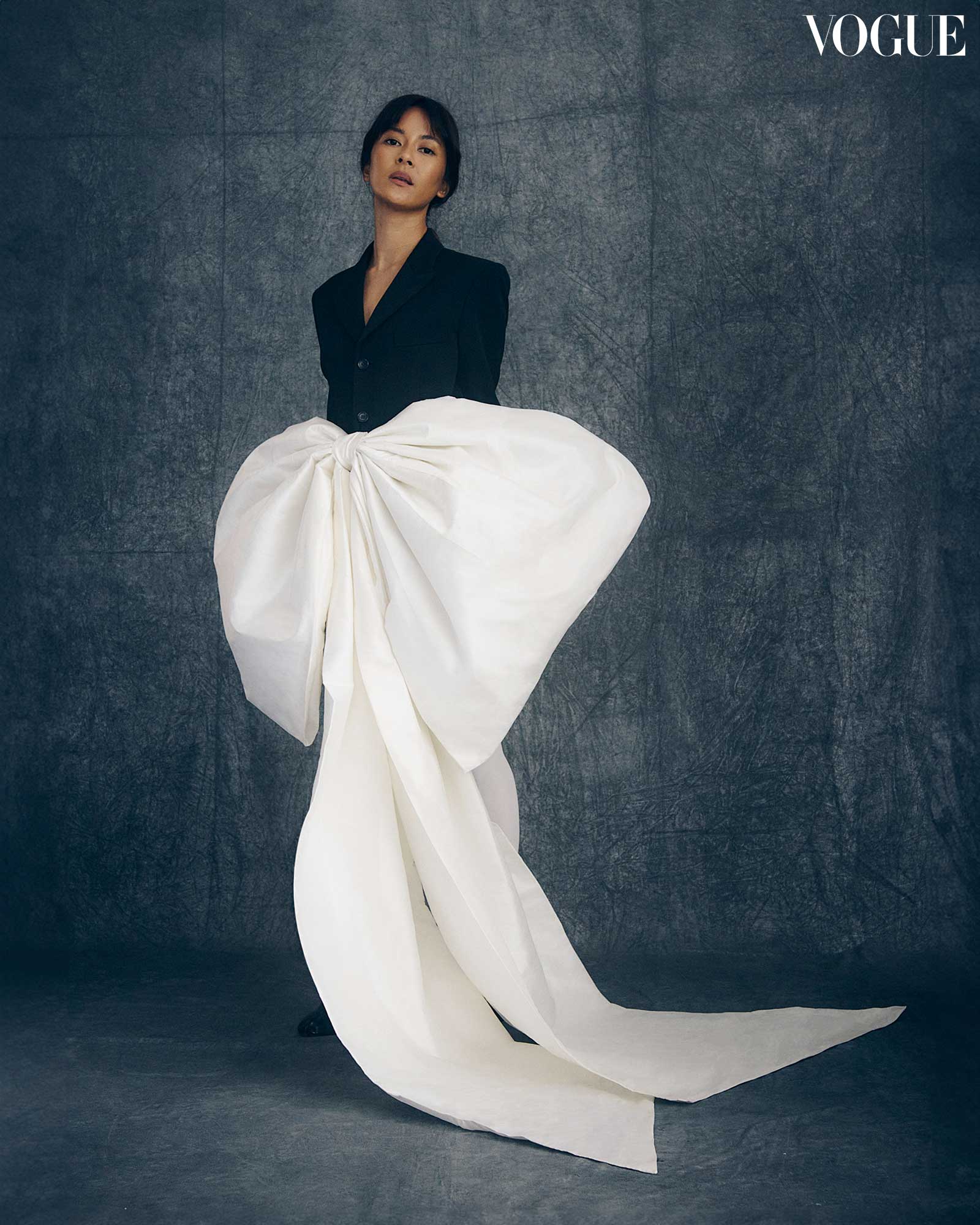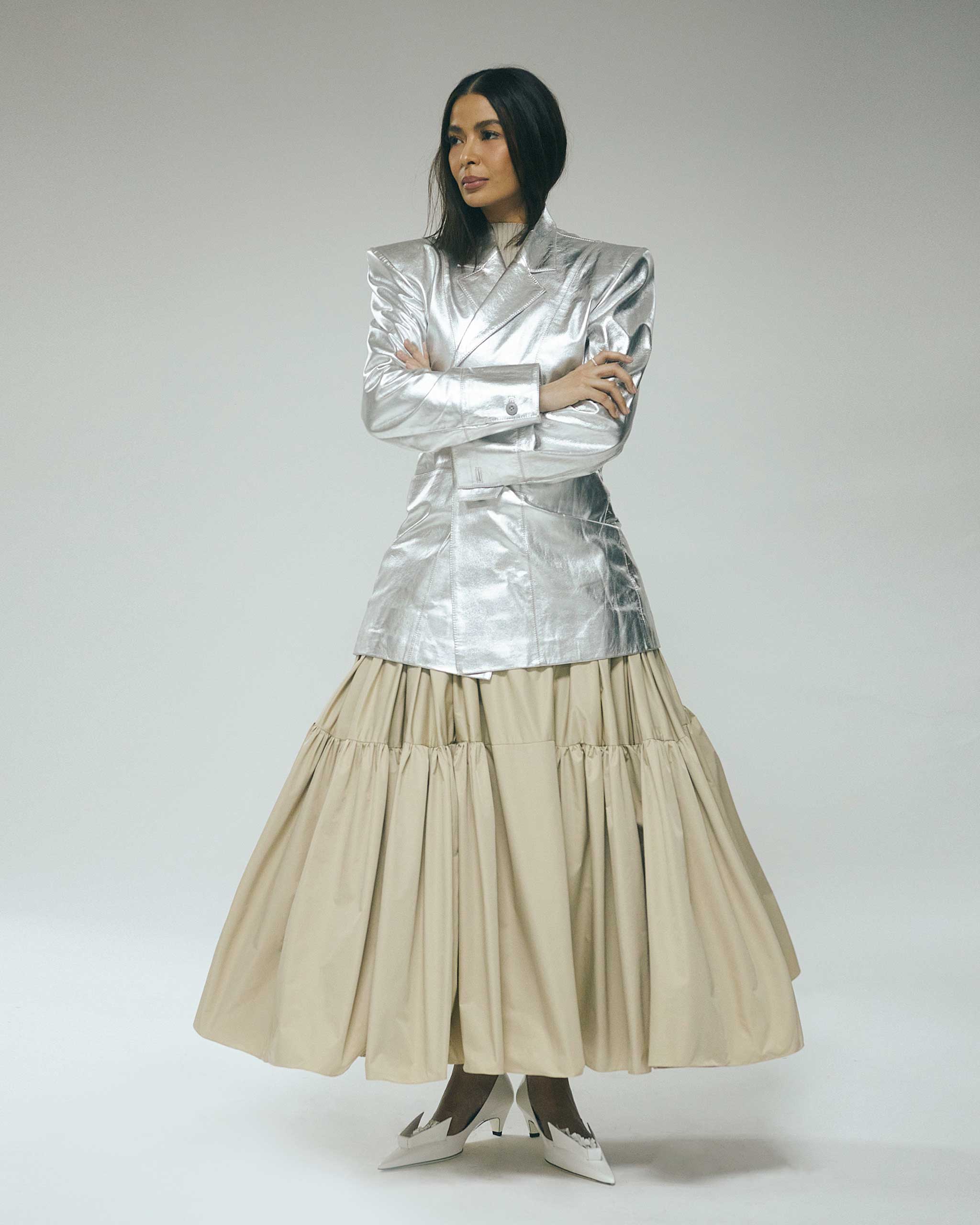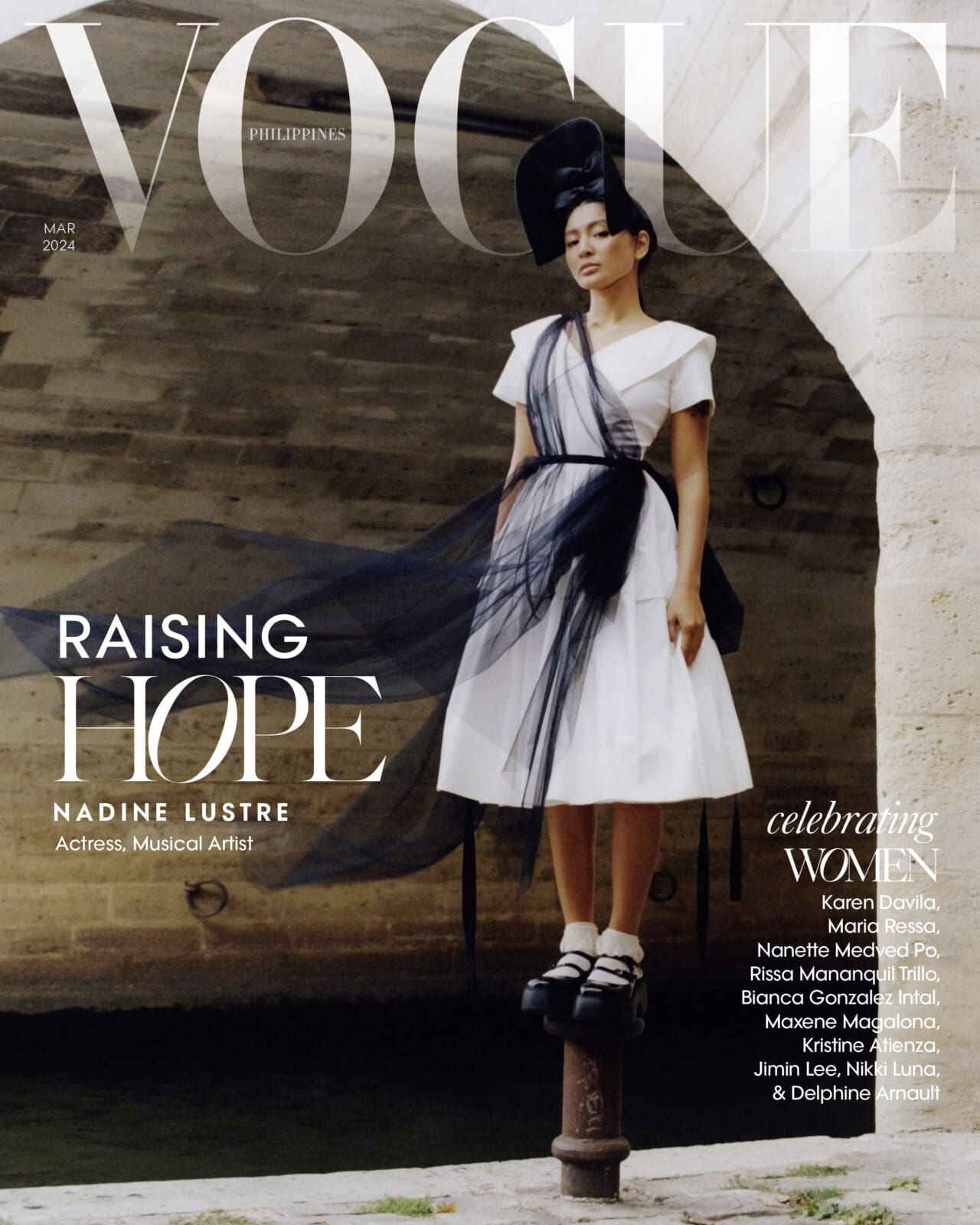CORDERO GALLERY blazer, VANIA ROMOFF skirt, PRADA shoes. Photographed by Colin Dancel for the March 2024 Issue of Vogue Philippines
Both Bianca Gonzalez Intal and Rissa Mananquil Trillo built careers out of speaking up within pages and on screens. Today, they use their voices to elevate those who need it most.
Bianca Gonzalez Intal and Rissa Mananquil Trillo appear in Vogue Philippines’ March 2024 issue, themed “Raising Hope” in the spirit of International Women’s Month. Visit vogue.ph everyday this month for daily features on inspiring women, as nominated by the people whose lives they’ve changed.
Before the existence of the internet as we know it, celebrities stayed out of social issues to appease as many supporters as possible. Very few things were as revolutionary as a pop star broadcasting their political ideologies; even a hint of controversy could cause brands to pull out endorsements. But today, this is standard fare. Public figures are expected to use their platforms for good: share resources and amplify the right stories, rather than provide entertainment alone.
Long before the tides turned, Bianca Gonzalez Intal and Rissa Mananquil Trillo were already riding the wave, championing women through their multi-hyphenate careers.

Bianca, for one, got her start on youth-oriented TV show Y Speak in the early aughts. Every week, she would craft stances on social issues and defend them in healthy, spirited debates. These skills came in handy as she built her community She Talks Asia and advice podcast Paano Ba ‘To. “I was always aware that the gender gap existed but I feel so privileged to be in an industry so inclusive of women and members of the LGBTQ+ community,” she shares. “When I realized that it wasn’t like that everywhere else, I wanted to learn about how the odds are really stacked up against women and help in whatever way I can.”
Meanwhile, Rissa’s early motherhood at 18 was responsible for her radicalization: “I experienced misogyny in different circles and dealt with an unequal [amount of] care work,” she says. “It became clear to me that one of the most tangible ways I could have a say over the direction of my life and my son’s was by becoming financially independent.” Since then, she became a firm believer in entrepreneurship as a tool for women’s economic independence, penning books and columns on the subject and putting it into practice.

These “advocacy sisters” found UN Women at the height of the pandemic. As the focus shifted from on-ground initiatives to online executions, the organization banked on well-known, outspoken women to spotlight pressing issues. Both got their start fighting for the Women Empowerment Principles (WEPs): seven standards that serve as a framework for businesses looking to be more gender-responsive. Bianca first participated in an interview series to gather signatories, while Rissa wrote a letter to her younger self after being heralded as a New Generation Women Leader. A roster of forums, events, and campaigns followed in rapid succession, all of which allowed them to congregate with other inspiring women.
Both Bianca and Rissa consider their first field mission a memorable moment in their stint as UN Women Champions. The excursion to Cotabato was held at a time when the women of Bangsamoro Autonomous Region of Muslim Mindanao (BARMM) were finding their place in political and peace processes. “During this trip, I had the honor of meeting women-led organizations and nonprofits driving women’s economic resilience in BARMM,” Rissa shares. “Listening to their unique stories and experiences further cemented my belief that economic empowerment translates to a transformative ability for women to participate in, influence, and lead change.”

Such in-person cultural exchanges are crucial for women affected by the digital divide. But even harder for Bianca was helping them unlearn archaic mindsets. “Back then, women in BARMM were still conditioned to believe that they couldn’t do anything without their husbands. But the women peacekeepers and mediators I met, like Aileen Hualde and Baba Connie Dumato, mobilized women to do early warning and early response work that can help de-escalate conflict in communities,” Bianca explains. A particularly heartwarming scene from the trip was seeing women who were relegated to passive roles in society, realizing that there was life for them outside the home.
Recently, Bianca and Rissa were brought together for UN Women’s annual gender-based violence campaign. Aptly titled “Babae, May Laban Ka!” changemakers across various sectors brainstormed ways to mitigate physical, sexual, and mental abuse towards women and girls. “I got to meet the pioneer feminists of our country, several of whom had been jailed, abused, and even separated from their children yet they have toiled for decades,” Rissa recalls. “What I learned is that we still have progress to make. Meeting Senator Loren Legarda at the shoot reminded me of that. She shared that she ‘was so young at 44’ when she authored the Anti-Violence Against Women and Children (VAWC) Act of 2004. Her mindset made me realize that there is no age limit for making a difference.”
As women in media and communications, Bianca knows their strengths lie in demystifying UN Women’s pillars and projects. “This year, we want to craft conversations centered on issues UN Women is passionate about, in a way that’s not so technical or data-heavy,” she says. “Communicating these messages one at a time, in ways that are not overwhelming, across strategic platforms and avenues hopefully makes a dent in changing mindsets.”

Outside their stellar work as UN Women Champions, Bianca and Rissa hold a special position that helps them shape the current generation of feminists: mothers to two daughters. Both of them are also supported by husbands who believe in the value of gender-neutral parenting. “I want Celestia and Audra to understand that who they are and how they look have nothing to do with their leadership, skills, goals, and worth,” Rissa beams. She documents these little wins on her Instagram, whether it’s the simple act of supporting their style choices or letting them plan family trips.
Bianca lives by the equally powerful principle that values are caught, not taught. “My mom was never the mapangaral or ma-sermon type: simply seeing that her and my sister, the two main women in my life, were such go-getters formed my idea of what a woman could be. So I hope to be to my daughters what my mom and sister were to me. It’s like I’m leading by example,” she says. Lucia and Carmen are only eight and five respectively, yet she observes how they pick up her movements, mannerisms, and knee-jerk reactions.
In today’s online landscape, it can be hard to find contentment in one’s efforts, especially when engagement metrics more or less determine who deserves to be heard. But it’s refreshing to see two public figures focused solely on sending the right message and serving the right audience instead, ceaselessly working until every woman stands tall on their own two feet. As someone (most likely, a wise woman herself) told Rissa: “The story isn’t finished when you find success. The story is finished when you find success for everyone else.”
By ANGEL MARTINEZ Photographs by COLIN DANCEL Fashion Director: PAM QUIÑONES. Makeup: Zidjian Paul Floro. Hair: Patty Inojales. Talents: Bianca Gonzalez Intal, Rissa Mananquil Trillo. Art Director: Jann Pascua. Producer: Anz Hizon. Nails: Extraordinail. Production Assistant: Bianca Zaragoza. Photographer’s Assistants: Iya Perez. Lighting Director: Joey Alvero. Stylist’s Assistant: Neil De Guzman. Retoucher: Iya Perez. Stylist Assistants: Geno Espidol, Jill Santos.

